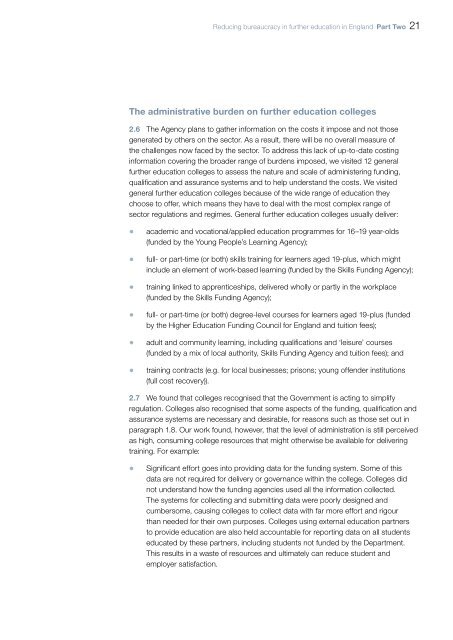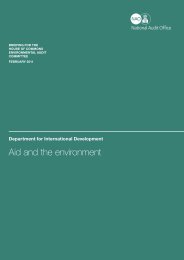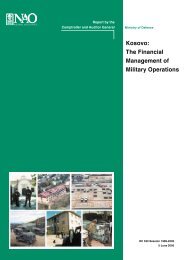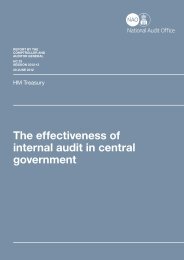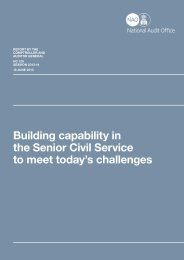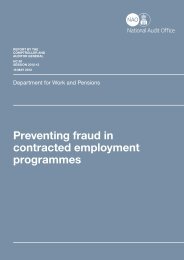Full report (pdf - 326KB) - National Audit Office
Full report (pdf - 326KB) - National Audit Office
Full report (pdf - 326KB) - National Audit Office
Create successful ePaper yourself
Turn your PDF publications into a flip-book with our unique Google optimized e-Paper software.
Reducing bureaucracy in further education in England Part Two 21<br />
The administrative burden on further education colleges<br />
2.6 The Agency plans to gather information on the costs it impose and not those<br />
generated by others on the sector. As a result, there will be no overall measure of<br />
the challenges now faced by the sector. To address this lack of up-to-date costing<br />
information covering the broader range of burdens imposed, we visited 12 general<br />
further education colleges to assess the nature and scale of administering funding,<br />
qualification and assurance systems and to help understand the costs. We visited<br />
general further education colleges because of the wide range of education they<br />
choose to offer, which means they have to deal with the most complex range of<br />
sector regulations and regimes. General further education colleges usually deliver:<br />
• academic and vocational/applied education programmes for 16–19 year‐olds<br />
(funded by the Young People’s Learning Agency);<br />
• full- or part-time (or both) skills training for learners aged 19-plus, which might<br />
include an element of work-based learning (funded by the Skills Funding Agency);<br />
• training linked to apprenticeships, delivered wholly or partly in the workplace<br />
(funded by the Skills Funding Agency);<br />
• full- or part-time (or both) degree-level courses for learners aged 19-plus (funded<br />
by the Higher Education Funding Council for England and tuition fees);<br />
• adult and community learning, including qualifications and ‘leisure’ courses<br />
(funded by a mix of local authority, Skills Funding Agency and tuition fees); and<br />
• training contracts (e.g. for local businesses; prisons; young offender institutions<br />
(full cost recovery)).<br />
2.7 We found that colleges recognised that the Government is acting to simplify<br />
regulation. Colleges also recognised that some aspects of the funding, qualification and<br />
assurance systems are necessary and desirable, for reasons such as those set out in<br />
paragraph 1.8. Our work found, however, that the level of administration is still perceived<br />
as high, consuming college resources that might otherwise be available for delivering<br />
training. For example:<br />
• Significant effort goes into providing data for the funding system. Some of this<br />
data are not required for delivery or governance within the college. Colleges did<br />
not understand how the funding agencies used all the information collected.<br />
The systems for collecting and submitting data were poorly designed and<br />
cumbersome, causing colleges to collect data with far more effort and rigour<br />
than needed for their own purposes. Colleges using external education partners<br />
to provide education are also held accountable for <strong>report</strong>ing data on all students<br />
educated by these partners, including students not funded by the Department.<br />
This results in a waste of resources and ultimately can reduce student and<br />
employer satisfaction.


